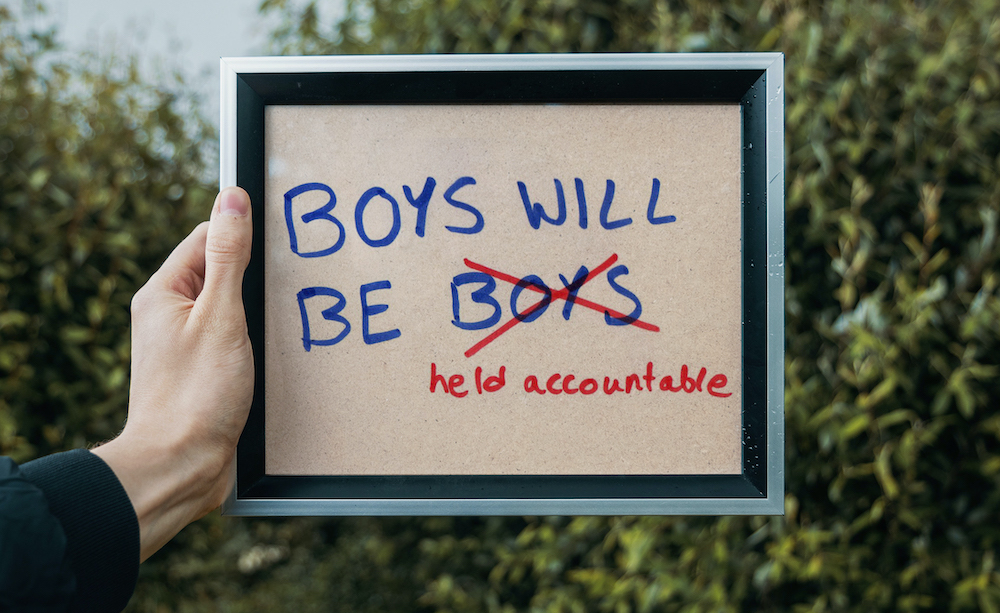“I don’t think you can ever protect your child from the patriarchy, but you can educate your child to recognize what it looks like and give them the tools to combat it,” says Salma El-Wardany.
At this time in Egypt, and the world, where many incidents including aggressions against women, leaking of photos without consent and sexual harassment are coming to light, one has to wonder how such issues can be prevented from the root. Is it education? Upbringing? The media?
In Egyptian culture, there’s a well-known adage saying that raising sons is much easier than raising daughters. Even in American culture, a song called “Soliloquy” that Frank Sinatra sang in the 1950s echoed the same sentiment, saying “You can have fun with a son, but you’ve got to be a father to a girl.”
From this angle, it starts to make sense why the majority of acts of violence against women are perpetrated by men. While women are often raised to the highest standards of behavior and ethics, many men are raised with the understanding that they can do close to anything because of their biological differences, perpetuated by phrases like “boys will be boys”.
According to the University of Utah, the biggest health threat to women is intimate partner violence, and more often than not, these partners are men.
As a result, what can be done? Helen Rizzo, associate professor of Sociology at The American University in Cairo, who identifies as a feminist, thinks it is necessary in today’s world that we raise our sons as feminists.
WHY?
“Given the social science research, the imposition of strict gender roles is limiting, constraining and not healthy for anyone (for example, toxic masculinity) and one of the goals of the feminist movement is convincing parents to socialize/raise their children differently,” Rizzo tells Egyptian Streets.
Self identified “fierce and proud” feminist and writer Salma El-Wardany also thinks it’s necessary in today’s world that we raise our children as feminists.
“It’s the only way to create a world that is equal and one in which everyone prospers. As long as women are oppressed the entire balance of our world remains off kilter,” El-Wardany tells Egyptian Streets.

HOW?
As a first step, Rizzo recommends valuing both stereotypical yet positive “masculine” and “feminine” traits, behaviors, and activities regardless of the sex/gender of the child who is exhibiting it.
“For example; a girl who wants to play sports should be encouraged to do so because of the positive benefits in terms of physical activity, teamwork, and leadership. On the other hand, boys should be encouraged to cry when they are upset, sad or frustrated and not reinforce that anger is the only acceptable emotional response,” Rizzo says.
Studies from George Mason University demonstrate that limiting boys’ abilities to express a wide range of emotional responses and encouraging them to be “in control” of their emotions by not expressing them hurts their emotional, mental, and physical health.
Secondly, preaching these behaviors to the children is not enough, parents need to model this behavior in the home.
“Household dividing tasks by sex/gender often leads to devaluing or taking for granted what is seen as feminine or women’s work and that this kind of work is “beneath” men and boys. If parents share/take turns in doing dishes, cleaning the bathroom, cooking, etc, children will get the message that this is work that needs to be done and the sex/gender of the person doing it doesn’t matter,” Rizzo adds.
Thirdly, families have to acknowledge that surroundings are important. Parents who are committed to raising their children with certain values, including feminist ones, have to surround themselves with at least some friends and family members who share their values to reinforce these values to their children.
“When they are around people who don’t share their values they may have to have uncomfortable conversations that they don’t want sexist and racist attitudes expressed around them and their children. I know this can be a difficult task,” Rizzo adds.
While El-Wardany is not a parent, she reflects on her experiences growing up.
As a fourth step, show don’t tell. “Kids have to see their own parents calling out injustice, talking about the patriarchy. We have to explain to children why women are oppressed and what their role is to help dismantle that system of oppression,” El-Wardany says.
Another step is to stop raising girls to be princesses and boys to be warriors.
“My nephew constantly wanted My Little Pony toys and so we all gave him them. We never once told him they were just for girls or that he should pick someone else. He’s six years old now and has the most impressive stack of pink and purple horses,” she adds.
As a sixth step, is to stop telling girls how pretty they are or solely focusing on their appearances.
“My mother never once told me I was pretty or beautiful. Instead she told me I was brilliant and clever, and that I could do anything. So I grew up not registering beauty as something to think about and always thought I was very capable,” El-Wardany says.
On the other hand, Adjunct Assistant Professor of Psychology at The American University in Cairo, Hala Wael Mahmoud, does not identify as a feminist.
“I identify more as a ‘humanist’. I think the word feminist has become widely misunderstood and believed to mean that someone is ‘against men’. So to avoid these negative connotations and misunderstandings, I think the term ‘humanist’ is better, since it refers to respecting and enforcing human rights for all genders,” Mahmoud tells Egyptian Streets.
It’s important to note that the word ‘feminist’’s dictionary definition is “the belief in social, economic, and political equality of the sexes” according to Britannica, which is the same meaning Mahmoud is using the word “Humanist” to imply.
“I think that raising children to be empathetic is the key point here. Being empathetic means that they are able to put themselves in someone else’s shoes and really take another’s perspective. Raising children to be empathetic means they will be highly sensitive to other people’s needs and rights – whether they are members of a different gender, social group, religion, or even for people who are challenged in any way,” Mahmoud adds.
THE ROLE OF FATHERS
The burden of parenting is often placed on the mother especially when it comes to attitude and behavior. Often, fathers are said to be “babysitting” while the mothers are “parenting” as if it is their sole job. Therefore, there are several steps that need to be taken so that a father or fatherly figure can lead by example for their sons in the future.
“I think we need to stop mollycoddling men and talking about ‘the steps’ they need to take. They need to just be a father, end of (story). We never talk about the steps mothers need to take. Why don’t we change our expectations; ask for more from our men, demand more, lift the bar higher. They need to be present, they need to be involved, they need to have conversations,” El-Wardany says.
That includes fathers being role models for their children, demonstrating respectful behavior and engaging in important conversations with their children. Rizzo adds that fathers need to be involved in the caring and nurturing part of parenting, and not be limited to their “stereotypical breadwinner role”.
“A boy will learn how to actively live against the patriarchy by watching his father. Sure you can tell him to respect women and help around the house, but if he watches his father cleaning and cooking and doing just as many school runs as mum, they’ll learn a lot better. Men need to be more involved in the running of households and the scheduling of their children’s lives,” El-Wardany adds.

“You Can Never Escape the Patriarchy”
However, there are often factors outside our control, whether in school, media or even other family members that have influence that may degrade women in the eyes of our children. Some would even worry that they don’t have a hand in how their child turns out to be. Often after a crime or a large-scale scandal, parents of the defendant claim they raised them to the best of their ability, and never expected them to become this way.
“Societal factors play a major role and you can never escape the patriarchy because it infiltrates everything, however, how you raise your child at home and what morals and lessons that child comes home to also plays a huge part,” adds El-Wardany.
While the woman shamers we keep uncovering today may have been impacted by their parenting, there are many factors that may have contributed to their current behavior. Because of the different factors, people and institutions that shape people as individuals, it is very difficult to decipher what the causes are in each situation.
“In regards to ending gender inequality and sexual and gender-based violence, change has to happen at many levels–family, school, politics, economics, social, and cultural levels. These complex problems require comprehensive solutions, so putting them blame only on parenting is not enough,” Rizzo adds.
Mahmoud also points out that many of the women shamers that we talk about are also women who have been impacted by parenting and cultural influences. This is what is called internalized sexism and misogyny, and it often can affect parenting as well, as it passes these sexist ideals from generation to generation.
Parenting is a slow process, and it will take multiple generations to be raised differently over decades to create real change. Isn’t that enough reason to start parenting our sons and daughters differently now?
*The opinions and ideas expressed in this article do not reflect the views of Egyptian Streets’ editorial team any other institution with which they are affiliated. To submit an opinion article, please email [email protected].




Comment (1)
[…] Quellen: Patriarchat (Soziologie) – Wikipedia WomenWatch: Women, Gender Equality and Climate Change (un.org) To Raise a Feminist Son: Why and How | Egyptian Streets […]